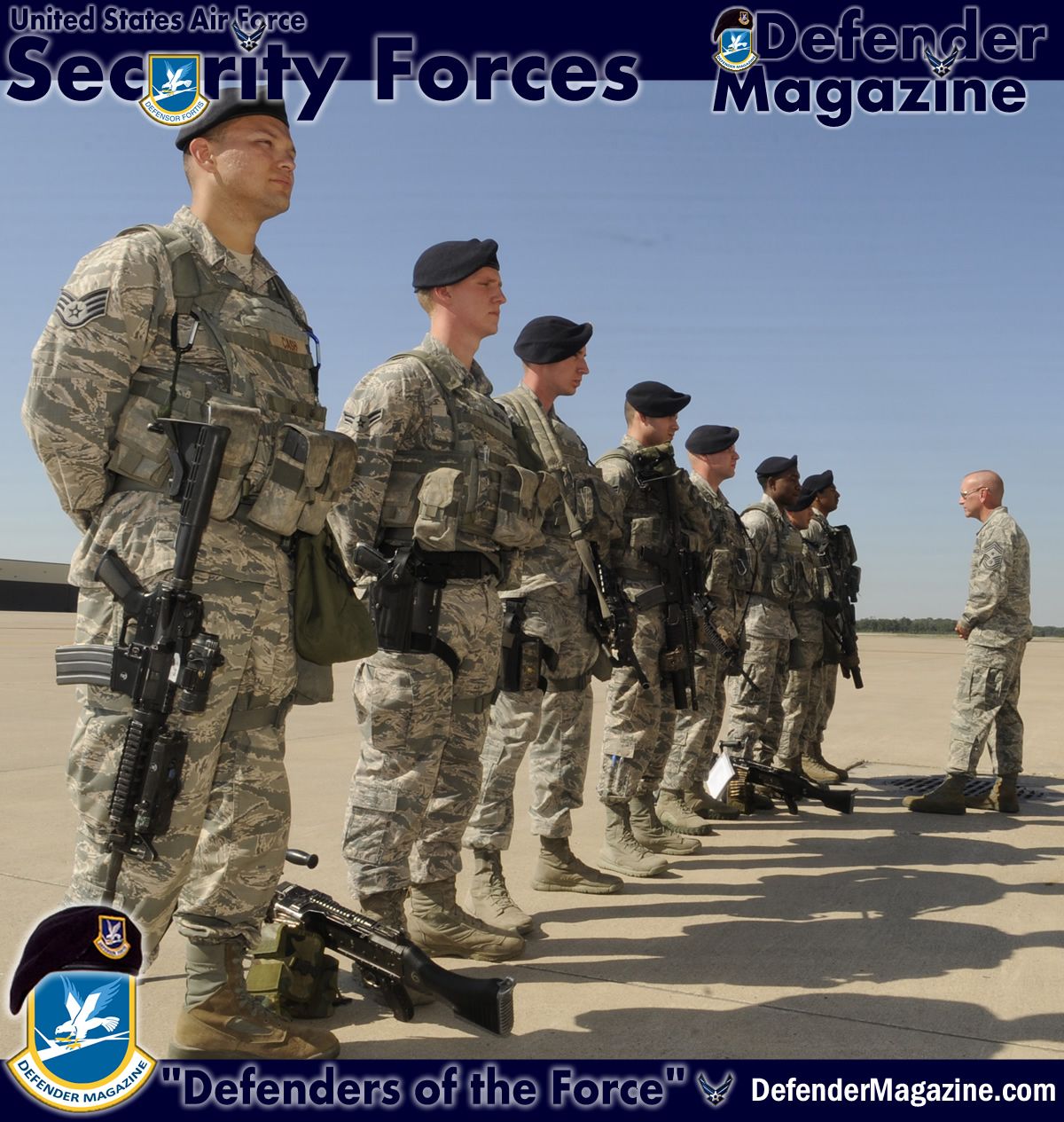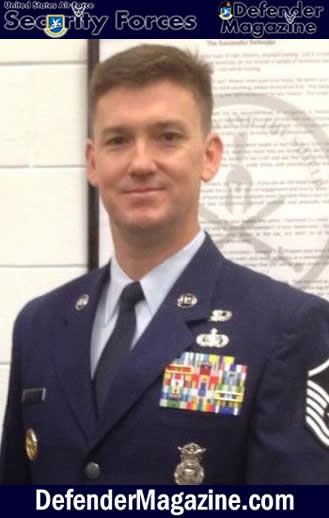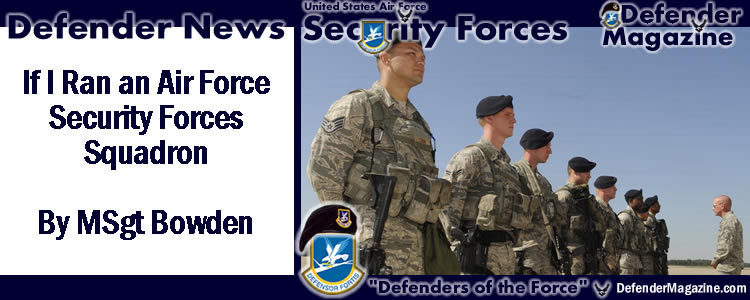About a year ago I was the new Security Forces Training NCO at Air National Guard Headquarters. My civilian counterpart, the functional area manager for Security Forces Training, who also serves part-time in the Air Guard, had just moved to a squadron where he assumed a new role as their operations superintendent. Having just come in from the field a month before, he asked if I had any suggestions before he headed to his unit for a few months to get settled in and re-calibrate the squadron’s compass with some fresh ideas and new vigor for their mission.
We chatted for a few minutes and I explained some areas that seemed to be trending throughout the field, but I didn’t offer anything too substantial he didn’t already know.
Later that night as I tossed and turned thinking about his question, I reflected on a friend’s comments about what he would do if he were a security forces squadron commander. The thing is he wasn’t even a Defender, but rather an AFSOC pilot, who has a personal interest in national security, antiterrorism, and air base defense. I think it’s important for any leader to solicit outside input from someone who may have different views, but relevant skillsets, to one’s own career field; and I valued what he had to say. Taking some of what he offered and tying it to my own thoughts, I got up from bed and started pecking away at my computer. I put myself in the boots of a new squadron commander and blocked the distractions of realistic and sometimes unfortunate requirements like computer based training and mandatory meetings; things we often use as excuses for not being where we think our unit should be and wrote out ten tenets I would follow if I were in charge.
As I’ve shared other opinions and experiences through writing articles and point papers, this will have a tone that represents our part-time force of Defenders in the Air National Guard. If you can look beyond that aspect of this writing, you may find something useful that could shift your unit or your Defender’s mindset into that of a warrior mindset. Even on the streets of an assumed safe Air Force base, a combat mindset and winning attitude is an intangible piece of equipment no Defender should leave the armory without.
- “Credibility is currency!” I would have it on the wall; I would make my Defenders say it at guard mount. Credibility is finite. We earn it when we contribute to the mission in a meaningful way. We earn it when we provide a good product to our customers quickly. We earn it when we understand the difference between bosses and customers. We lose it when we look or act foolish in public. We lose it when we have conduct issues in our ranks. We lose it when we give off attitude to anyone.
- Our first mission is a combat mission: The defense of the base from enemy combatants both at home and abroad. We execute that mission with aggression. When some turd rockets the deployed base, we go out there and shoot him; exploit what is left of him, and leave him as a warning to the next guy. We fight for intelligence because in defense, intelligence means survival, intelligence is like oxygen for Defenders. We work with our Civil Engineering partners to harden the ever-loving hell out of the base. In CONUS, that mission never goes away. We study events like Fort Hood and the Fort Dix plot and figure out how to keep it from happening at our base. In the defense role, we are never “not at war.” We are infinitely more concerned with the guy parking off the departure end of the runway out on South Perimeter Road taking pictures than we are over whether SSgt Tentpeg is going 27 mph in a 25.
- We are not the Army. We are not infantry. We have different missions and different cultures. We will do OUR mission better than anyone. We take lessons from ALL ground counterparts with good ideas. We steal ideas from other services, other countries, and both the public and private sectors because we cannot afford to be locked in to an obsolete dogmatic culture. We constantly train and retrain to be technical and tactical experts in combat defense and law enforcement. We want to know how the Israelis guard Hatzerim Airbase. We want to know how the U.S. Secret Service (USSS) and Diplomatic Security Service (DSS) provide physical security for dignitary residences. We want to know what Army MPs changed at Ft Hood after the shooting. We want to know how the Central Intelligence Agency (CIA) headquarters arranged its entry control point after its shooting in 1993. We know that specialized Army ground units carry their rifles down, and specialized Navy ground units carry their rifles up; and we KNOW why we chose to carry our rifles X and can explain it in a rational way.
- We know that balance is the most important part of security. We are in the business of risk management. We want to execute security measures that maximize juice and minimize squeeze. If our security keeps or delays authorized personnel from conducting their authorized mission, we have failed.
- We will keep our personal and professional conduct above reproach. We are the sheepdogs; and predators within our ranks will be dealt with in the harshest lawful way.
- We will be the deadliest airmen on the base. We have to be. We will commit time, energy, and funds to training harder and smarter than anyone else. We will know from our youngest Airman to our oldest Chief that we can outshoot, out-communicate, and out-maneuver a well-trained adversary and even an insider threat. We will be on the range, in the shoot-house, and running realistic drills every single day.
- We are a law enforcement agency with ALL of the advantages. We have a helpful population and substantially more freedom of action to search and seize. This will be a zero crime base. We will make ourselves credible and approachable so that the base population WANTS to work with us and tip us off to predators in their ranks. We will make this a safe base where people feel comfortable walking around at night. We will educate the base population to identify and report threats; harden themselves, their homes, and facilities with something more meaningful than an annual CBT. We will create a herd immunity. We will also steal innovative law enforcement tactics, techniques, and procedures from any law enforcement agency with a good idea – from the FBI to the smallest local police department.
- Image matters. We will set an example worth following in how we wear uniforms, interact with our customers politely and professionally, and carry ourselves with dignity. We will not have fat members because we have to be able to outrun and outfight a committed adversary and fat is not tactical!
- No more “hoorah” or cheerleading. Our pride comes from the fact that no one screws with OUR planes, OUR pilots, OUR secrets, OUR flight line, and OUR base. We don’t need a tattoo of a grim reaper mowing down the Taliban on a Harley to know what we do is cool and important. We do what we do so that OTHERS can go outside the wire and then come home and sleep without having to worry about a suicide bomber getting through the wire, so they can go out there and do it the next day. It will almost always be a thankless job. Anytime you want to try out for Tactical Air Control Party (TACP), I will assist you in taking the first step; in the meantime do THIS job, and do it better than anyone else in the world – because if someone finds a chink in our armor, it is a strategic and likely catastrophic loss.
- Make yourself smarter! We need to absorb knowledge by reading books about leadership, training, war, and of our career field. Books like The Mission, Then Men, and Me that discuss the importance of out of the box military thinking and listening to the guy on the ground. Learning from historical materials about Air Base Defense in Vietnam to understand what worked and what didn’t or more recent publications like Defending Air Bases in an Age of Insurgency. We need to associate with professional organizations like ASIS International and require representation at local JTTF A commander owes it to their Defenders to provide educational resources, realistic training, and upfront leadership.
By MSgt Peter Bowden
Air National Guard Security Forces
U.S. Air Force Chief Master Sgt. Brian Hornback, Air Force Global Strike Command command chief, listens to 509th Security Forces Squadron Airmen recite their post briefings during a visit to Whiteman Air Force Base, Mo., Sept. 6, 2013. Hornback visited the bomb wing staff agencies, security forces squadron and flightline units. (U.S. Air Force photo by Staff Sgt. Alexandra M. Boutte/Released)


